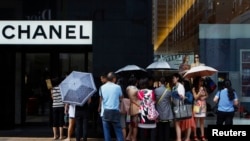As Hong Kong’s Umbrella Revolution extends beyond the sensitive period of the national public holiday marking the 65th anniversary of the founding of the People’s Republic of China, concerns mount about the potential damage the occupation of Hong Kong's central business district might have on the economy. While support for the movement is widespread, small and medium-sized enterprises are already beginning to hurt.
On Wednesday, in the snarled traffic of old Kowloon, a motorist was arrested for attempting to drive his vehicle through the midst of several hundred democracy protesters. As police detain the driver, a shopkeeper named Kwok told reporters that his sympathies lie with the vehicle owner, that the activists’ camps are an increasing nuisance and an impediment to ordinary folk going about their business.
“They disturb my work and all the people working, studying, and they make all the trouble for other people,” said Kwok.
As of December 2013, small to medium-sized enterprises account for more than 98 percent of Hong Kong’s business units and 48 percent of private sector employment.
The Occupy Central movement is hurting entrepreneurs and things will deteriorate the longer the protest goes on said Sam Pannu, a textile manufacturer.
“Business-minded Hong Kong people are really afraid. You see, over there in Central businesses and banks are closed. It is really affecting business. But not that dramatically, because I believe these people will move away within a week - I hope they will go away and business will be normal within a week,” said Pannu.
Ministerial briefings discreetly suggest that the Hong Kong government believes that support for the democracy movement will wane as the days - and the civil chaos - drag on.
The activists are clearly concerned too. Close to tears, the co-founder of the Occupy Central movement, Chan Kin-man, issued an apology to the business community Wednesday afternoon and asked for its forbearance.
“I hope everyone in the community understands that we might create a short-term disturbance. But we are fighting for the long-term harmony of society. Without an equal election system, we will continue to debate, argue and divide. But this is not the Hong Kong we want. So I hope they can be more tolerant, but I would like to apologize if we cause any problem to them,” said Chan.
The service sector is particularly vulnerable. Researchers suggest one way the central government in Beijing could precipitate the demise of the Umbrella Revolution is to ban mainlanders from traveling to Hong Kong.
Low-paid jobs dependent on the 30 million mainland tourists who visit Hong Kong each year would quickly be cut, potentially generating ill will towards the movement among grassroots supporters fired by store and restaurant owners.
But out on the streets there appears to be patience - at least for now. One entertainer, a young father taking in the atmosphere at the Central protest site who preferred not to give his name, said sacrifices must be made to achieve democracy for future generations.
“The causes that are being represented here are universal causes. They are all just. Specifically, freedom of speech, to vote for who you want to vote for and freedom to assemble. These are things China will take away. These are issues that affect me and my family… and the world our baby will grow up in,” the man said.
Nonetheless, a city dependent on trade and business could see its democracy movement fatally undermined if and when its citizens are forced to choose between their short-term well-being and their long-term freedoms.




